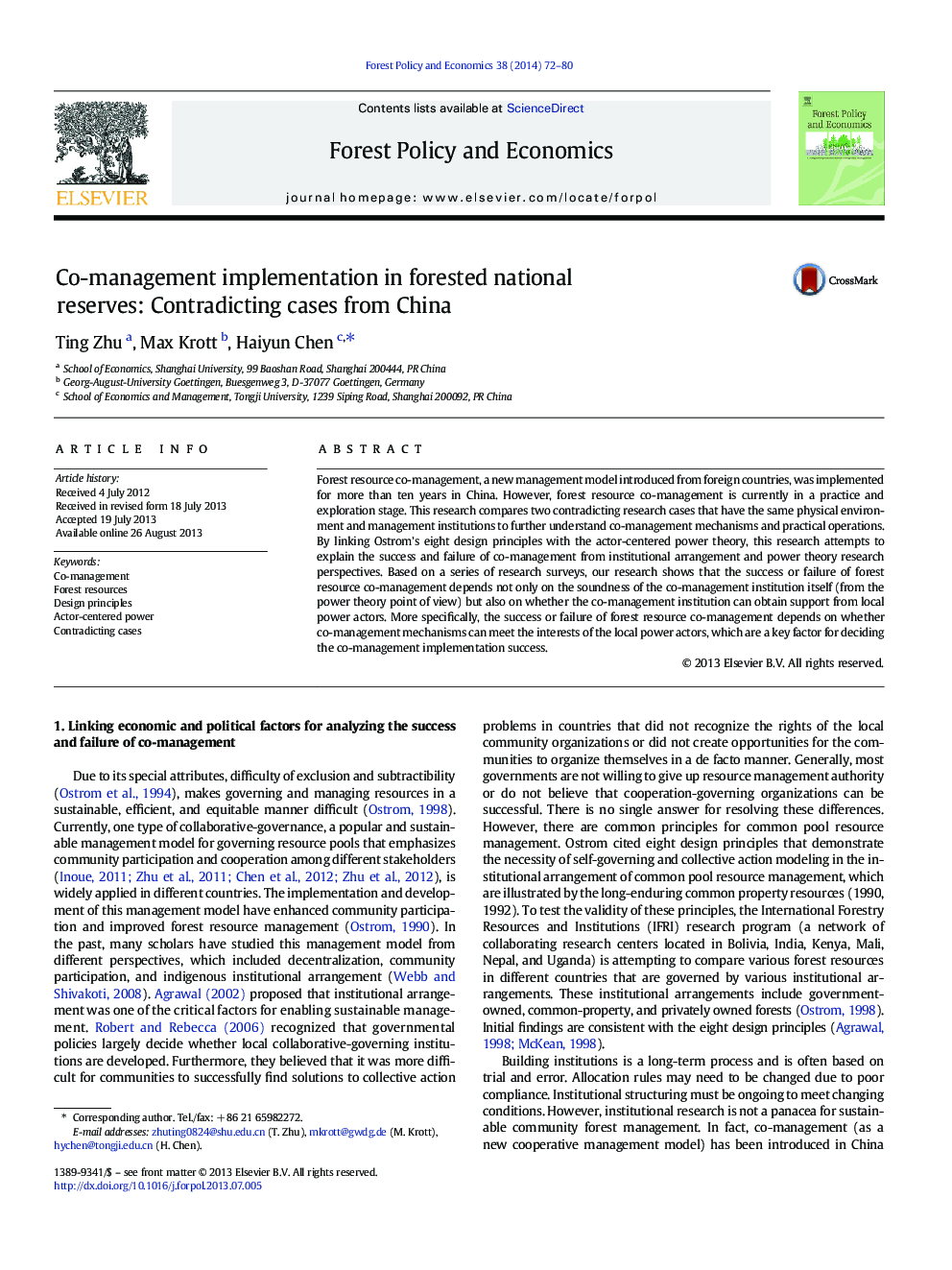| کد مقاله | کد نشریه | سال انتشار | مقاله انگلیسی | نسخه تمام متن |
|---|---|---|---|---|
| 6545015 | 159874 | 2014 | 9 صفحه PDF | دانلود رایگان |
عنوان انگلیسی مقاله ISI
Co-management implementation in forested national reserves: Contradicting cases from China
ترجمه فارسی عنوان
پیاده سازی مدیریت همکاری در ذخایر ملی جنگل: موارد متضاد از چین
دانلود مقاله + سفارش ترجمه
دانلود مقاله ISI انگلیسی
رایگان برای ایرانیان
کلمات کلیدی
مدیریت همکاری، منابع جنگل، اصول طراحی، قدرت متمرکز بر بازیگر، موارد متضاد،
ترجمه چکیده
مدیریت منابع منابع جنگلی، یک مدل مدیریت جدید معرفی شده از کشورهای خارجی، برای بیش از ده سال در چین اجرا شد. با این حال، مدیریت مدیریت منابع جنگل در حال حاضر در مرحله عمل و اکتشاف است. این تحقیق دو مورد متضادی را بررسی می کند که محیط فیزیکی و نهادهای مدیریتی یکسانی دارند تا مکانیزم های مدیریت همکاری و عملیات عملی را درک کنند. با پیوند دادن هشت اصل طراحی استروم با تئوری قدرت بازیگری تمرکز یافته، این پژوهش تلاش می کند تا موفقیت و شکست مدیریت هماهنگ را از دیدگاه های تحقیقاتی نظریه نهادی و نظریه قدرت توضیح دهد. بر اساس یک سری تحقیقات تحقیقاتی، تحقیقات ما نشان می دهد که موفقیت یا شکست مدیریت مدیریت منابع جنگل نه تنها بر پایه صلاحیت نهاد موسسه هماهنگ (از دیدگاه نظریه قدرت) بلکه همچنین بر این است که آیا شرکت موسسه مدیریت می تواند از بازیگران قدرت محلی حمایت کند. به طور خاص، موفقیت یا شکست مدیریت مدیریت منابع جنگل به این بستگی دارد که آیا مکانیزم های مدیریت همکاری می توانند منافع بازیگران قدرت محلی را برآورده کنند، که عامل اصلی تصمیم گیری موفقیت پیاده سازی مدیریت همکاری است.
موضوعات مرتبط
علوم زیستی و بیوفناوری
علوم کشاورزی و بیولوژیک
جنگلداری
چکیده انگلیسی
Forest resource co-management, a new management model introduced from foreign countries, was implemented for more than ten years in China. However, forest resource co-management is currently in a practice and exploration stage. This research compares two contradicting research cases that have the same physical environment and management institutions to further understand co-management mechanisms and practical operations. By linking Ostrom's eight design principles with the actor-centered power theory, this research attempts to explain the success and failure of co-management from institutional arrangement and power theory research perspectives. Based on a series of research surveys, our research shows that the success or failure of forest resource co-management depends not only on the soundness of the co-management institution itself (from the power theory point of view) but also on whether the co-management institution can obtain support from local power actors. More specifically, the success or failure of forest resource co-management depends on whether co-management mechanisms can meet the interests of the local power actors, which are a key factor for deciding the co-management implementation success.
ناشر
Database: Elsevier - ScienceDirect (ساینس دایرکت)
Journal: Forest Policy and Economics - Volume 38, January 2014, Pages 72-80
Journal: Forest Policy and Economics - Volume 38, January 2014, Pages 72-80
نویسندگان
Ting Zhu, Max Krott, Haiyun Chen,
